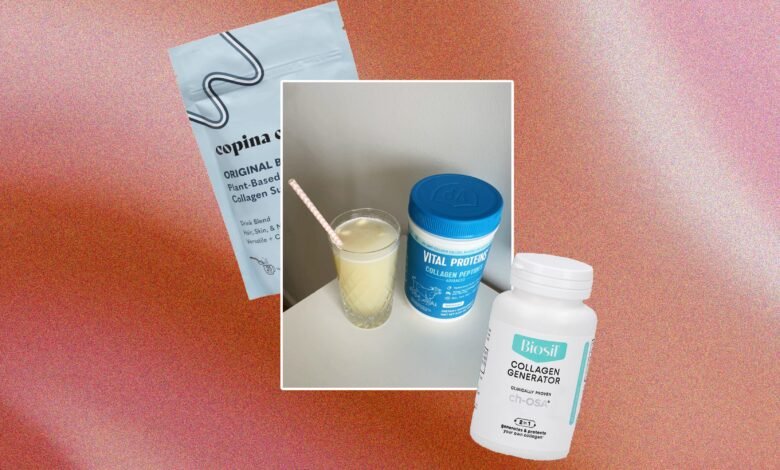12 Best Collagen Supplements for Women, Reviewed by Experts 2024

If you’re interested in trying collagen supplements for beauty and health benefits, here are some clear criteria from Dr. Chon—in consensus with multiple other dermatologists Glamour surveyed—to consider before buying:
Type of collagen
Again, there are 28 types of collagen, but the ones most frequently used in supplements are types I to III—mimicking the most common forms of collagen found in the human body. Types I and III are good for supporting healthy skin, hair, and nails; type II collagen is ideal for joints and cartilage. Collagen type I can help support overall skin health and address complexion concerns such as sagging skin.
Collagen source
Collagen is typically derived from bovine (cow) or marine (fish) sources. Dr. King recommends seeking out collagen products sourced from organically raised animals whenever possible. Collagen is not vegan; per a 2020 review, the protein “originate[s] from animal sources” and therefore cannot be plant-based; if you have dietary restrictions or allergies, this is an important factor to consider. However, you can find vegan formulas that help stimulate your body’s own collagen production. (Researchers have used genetically engineered microorganisms to create what is essentially vegan collagen, according to recently published research, but no product using this technology is available to consumers.)
Form
Collagen supplements come in various forms, including powders you can stir into water or coffee, capsules, and liquids. Hydrolyzed collagen and collagen peptides have been broken down into smaller molecules, which are easier for your body to absorb and incorporate toward skin, hair, and nails. According to Kseniya Kobets, MD, director of cosmetic dermatology at Montefiore Advanced Care, you can get the most benefits from at least 2.5 grams daily, as most studies show; however, 10 to 12 grams of collagen provide the maximum perks for your skin, joints, and hair.
Ingredients
Try to avoid products with added sugars or artificial flavors and colors. Do keep an eye out for health- and skin-supporting ingredients, like vitamin C and hyaluronic acid.
Thorough testing and vetting
Look for products that have been tested for purity and safety by a trusted third party. This third-party certification ensures that the supplement contains exactly what it claims to offer, with no filler or harmful contaminants. It’s also beneficial to seek out brands that conduct clinical trials on their products, offering data on each one’s potential efficacy. Making sure that bovine sources of collagen are pasture-raised and grass-fed is also important to determine trustworthiness and sustainability. “Look for labels that are certified by the American Grassfed Association (AGA) to ensure the supplement is antibiotic- and growth-hormone-free,” says Dr. King. And on top of that, do some research on each brand, prioritizing ones that are well-established, transparent about their sourcing and production processes, and liked by customers.




